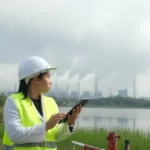Featured articles
-
Case studies of cities using geothermal energy successfully
April 28, 2024 -
The social impact of geothermal energy
April 28, 2024 -
Geothermal education and awareness-raising
April 28, 2024 -
Geothermal energy and sustainable development
April 28, 2024
As cities face the growing challenges of fossil fuel dependency, volatile energy prices and the environmental impacts of climate change, finding sustainable solutions to ensure their energy security is becoming an absolute priority. Geothermal energy, drawing on the Earth’s natural heat, is a promising renewable energy source for meeting these challenges and contributing to the energy autonomy of cities.
Improving urban energy security with geothermal energy
Integrating geothermal energy into a city’s energy mix offers many advantages for boosting energy security:
- Reduced dependence on fossil fuels: By substituting geothermal energy for fossil fuels, cities can significantly reduce their dependence on energy imports, which are often costly and subject to price fluctuations.
- Stable energy prices: Geothermal energy provides a stable, local source of energy, enabling cities to protect themselves against the volatility of international energy markets.
- Strengthening energy resilience: By diversifying their energy sources and relying on local renewable resources, cities increase their resilience to energy supply disruptions.
- Contribution to energy sovereignty: Geothermal energy enables cities to take ownership of their energy production and reduce their dependence on external energy suppliers.
Examples of cities boosting their energy security with geothermal energy
Many cities around the world have already made geothermal energy a key part of their energy security strategy:
- Zurich, Switzerland: The city of Zurich has set up a vast geothermal heating network that supplies heating and domestic hot water to over 40% of the city’s buildings, contributing to a significant reduction in its dependence on natural gas.
- Munich, Germany: The German city of Munich is committed to becoming a carbon-neutral city by 2030, and geothermal energy plays a crucial role in this strategy. The city already operates several geothermal power plants and plans to develop more in the coming years.
- Pau, France: The French city of Pau has made geothermal energy a major source of district heating, supplying over 80% of the city’s needs. This project has considerably reduced CO2 emissions and strengthened the city’s energy independence.
Conclusion
Geothermal energy is an essential pillar in ensuring energy security for cities. By offering a renewable, local and stable source of energy, geothermal power enables cities to reduce their dependence on fossil fuels, protect themselves against volatile energy prices and help build a sustainable and resilient energy future.
Key factors for successful deployment of geothermal energy for urban energy security :
- In-depth assessment of geothermal potential: An in-depth study of a city’s geothermal potential is essential to identify the most promising sites and assess the feasibility of projects.
- Development of favorable regulatory frameworks: Clear government policies and incentives are needed to encourage investment in geothermal projects and facilitate their deployment.
- Innovative financing and public-private partnerships: Innovative financing models and strong public-private partnerships are essential to mobilize the resources needed to develop large-scale geothermal projects.
- Public awareness and involvement: Informing the public about the benefits of geothermal energy and its role in energy security is crucial to gaining community acceptance and support.
In conclusion, geothermal energy offers a promising solution for boosting energy security in cities and contributing to a sustainable, clean and resilient energy future. By combining strategic planning, appropriate investment and effective collaboration between the various players, cities can set themselves firmly on the road to energy autonomy and sustainability.



